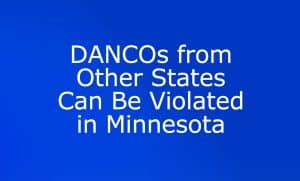DANCOs from Other States Can Be Violated in Minnesota
Recently, the Minnesota Court of Appeals determined that domestic-abuse no-contact orders (DANCOs) from other states can be violated in Minnesota. In State v. Walton, the defendant had a no-contact order against him issued by a court in Rhode Island. It stated that the defendant was to have no contact with the alleged victim. Bloomington police responded to a report of a physical altercation at the Mall of America and encountered the defendant. Law enforcement discovered the no-contact order from Rhode Island and arrested defendant for violating a DANCO within ten years of two or more qualified domestic-violence-related offenses, which is a felony offense in Minnesota.
In Walton, the defendant decided to waive his right to a jury trial and had a court trial, which means the judge was the sole decider of guilt or innocence. The district court judge found the defendant guilty of violating a DANCO. On appeal, Walton argued that the Rhode Island no-contact order does not qualify as a DANCO, and the evidence was insufficient to support a conviction. The Minnesota Court of Appeals determined that DANCOs issued outside of Minnesota can absolutely qualify as a DANCO for Minnesota charging purposes. But, the court of appeals found that there was insufficient evidence to support the conviction because the prosecution did not establish that the Rhode Island no-contact order was issued in a proceeding consistent with Minnesota laws. The court reasoned that no-contact orders from other states must be issued in a proceeding involving at least one of the offenses enumerated in section 629.75, subdivision 1(a).The prosecution failed to do that during the court trial, which led to the reversal by the court of appeals.
Often, when charges in Minnesota rely on evidence of court orders, records, and general happenings of things from other states, it is the prosecution’s burden to prove the validity and relevance of out-of-state shenanigans. Minnesota courts, especially appellate courts, will be careful to make sure the out-of-state orders and laws are consistent with Minnesota law. Even if the out-of-state happening truly happened, it is still the prosecution’s burden to prove that it did, how it is relevant, and why it is admissible in the Minnesota case. Sometimes, you just have to put the prosecution to its burden of proof. Nothing is truer than when you are dealing with a DANCO violation case. Prosecutors often just need to prove a DANCO existed, and the defendant violated it by having contact with the person. Super easy when law enforcement finds the two people together at the Mall of America after a reports of a fight.
Robert H. Ambrose is a criminal defense lawyer and DWI attorney in the Twin Cities and the state of Wisconsin. Super Lawyers named him a Super Lawyer for the past three years and a Rising Star in the preceding six years. He is an adjunct professor at the University of Minnesota Law School. DWI Attorney Minneapolis MN; Criminal Defense Attorney Wisconsin; and Criminal Appeals Lawyer Minnesota.
